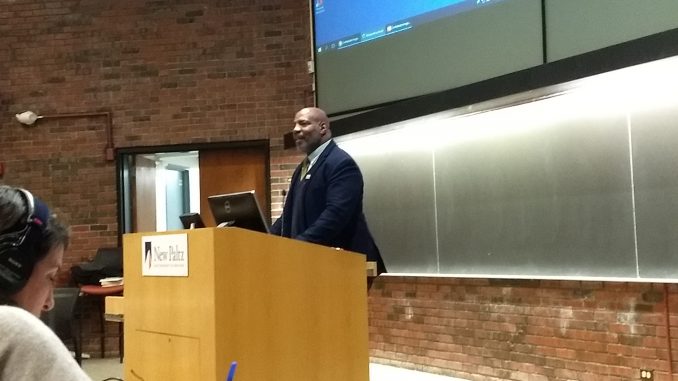
Education is the key in unveiling the reality of America’s past. Dr. Jelani Cobb does this with a journalistic historical scope.
The history of America and the African American community has been cloaked with lies, amnesia and denial.
On March 11, Dr. Jelani Cobb gave his first address to SUNY New Paltz titled “The Half-Life of Freedom: Race and the Evasion of American History.” This discussion tied into his Ottaway Visiting Professor seminar, which will explore the notion of journalism as the “first draft of history.” The two week course, which is worth one credit, will offer the skills of obtaining historical perspective that can be helpful for aspiring journalists who hope to cultivate a long view of contemporary events.
Before Cobb took to the podium, he was presented with Doris Helen Kearns’ book “Leadership: In Turbulent Times” and, what President Donald Christian noted as a tongue-in-cheek tradition, a Society of Ottaway Fellows membership card to which Cobb asked, “Can I get any discounts or anything?” earning some laughs from the attendees.
In recent years, a great deal of conflict has risen over the value of Confederate icons and where they belong in American society—or if they belong at all. When it comes to honoring those who do not fare well in the eyes of revisionist history, Cobb gave three suggestions for improving the political climate and the spaces that revolve around them.
What was his recommendation on the criteria of honoring figures within history that may be worthy of praise or having a monument or plaque made in their name?
“No one who has violated the human rights of another person,” Cobb said. “That’s it.”
The historian mentioned Trump’s outrage that was observed over the removal of particular confederate monuments and if Thomas Jefferson would be next. Cobb gave no defense to the third U.S. president, but instead reminded the audience that Jefferson owned 608 black slaves, including his own children.
“It is possible to recognize, to honor and utilize Jefferson’s thinking and the ways in which it became foundational to democracy in the United States without fetishizing Jefferson the man. We can do both of these things,” Cobb said.
When something needs to be renamed, there is an impulse to remove the piece completely, which erases the mentality or thoughts of a time period. Cobb would prefer to see an indicator of the former honoree.
Cobb’s strongest sentiment of the night was the relationship of diversity and inclusion and their implications. Diversity, Cobb described, is something akin to “an ethnic or racial garnish,” where inclusion is democracy.
“Diversity creates guests. Inclusion creates stakeholders,” said Cobb.
Cobb also touched on SUNY New Paltz’s embattlement of honoring those who do not fare well in the revisionist history with the removal of the names of Huguenot founders and slave holders from buildings in the Hasbrouck complex.
“I commend you for being willing to engage in this process, for asking these questions and not flinching about where the path of history might lead you,” Cobb said. Cobb also admitted that he was “a little perplexed” by the opposition College Council board member Robert J. DiCarlo faces.
“I didn’t know if his arguments were being made in bad faith or if they were good-faith arguments being made poorly,” Cobb said. “You would almost believe that the slaves owned by Huguenots were the people at fault … We’re not talking about mentalities. We’re talking about empiricism, we’re talking about data, we’re talking about facts … The only way we can have this confusion is because we have not been willing to look at the past for what it is.”
Those who were unable to attend the lecture can view the presentation at http://newpaltz.mediasite.suny.edu.
